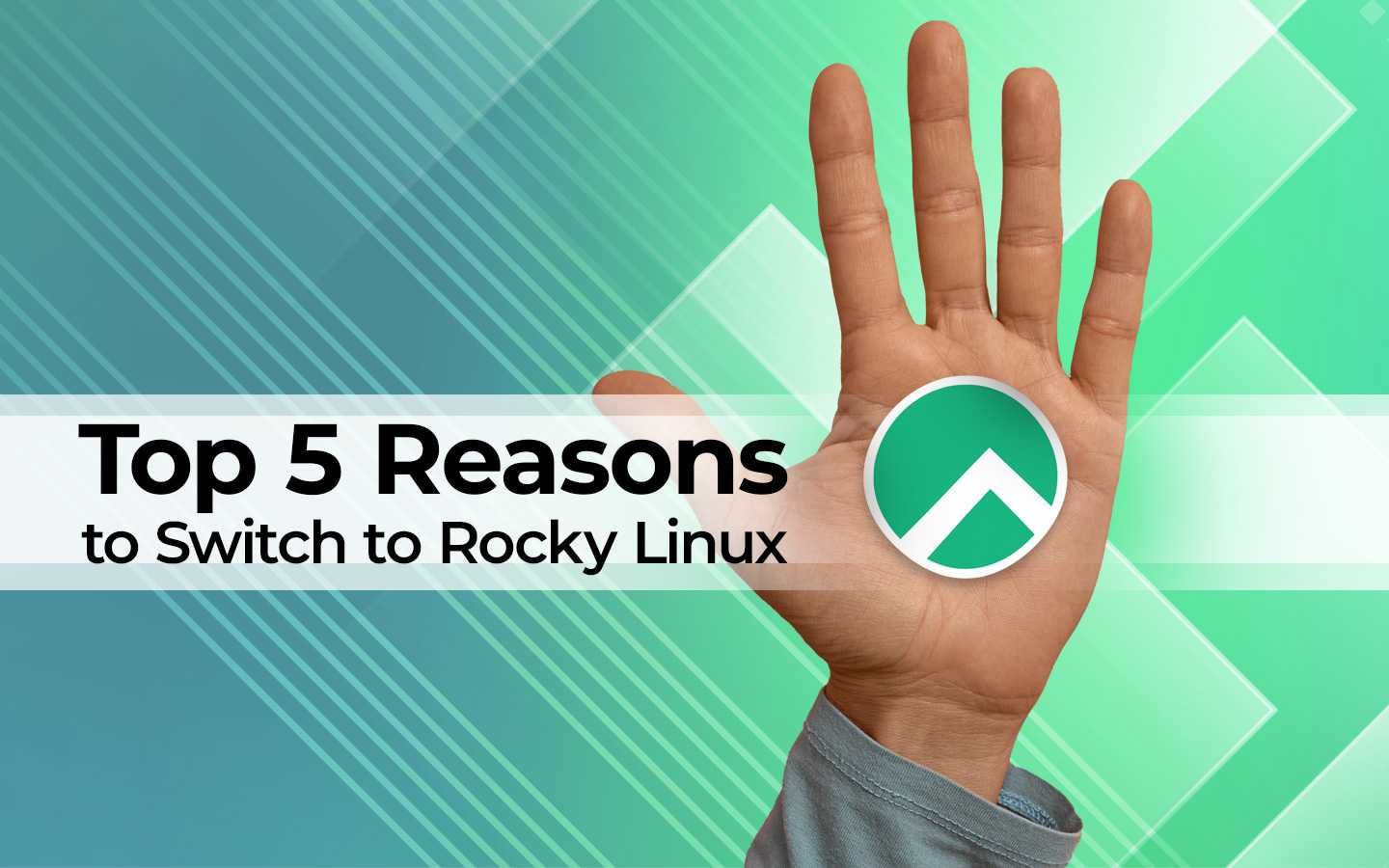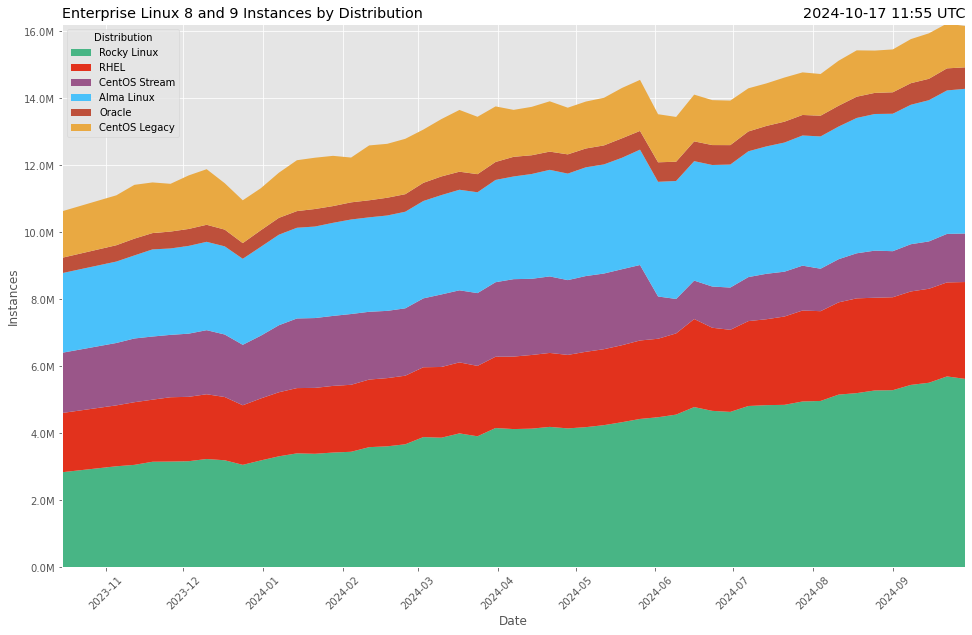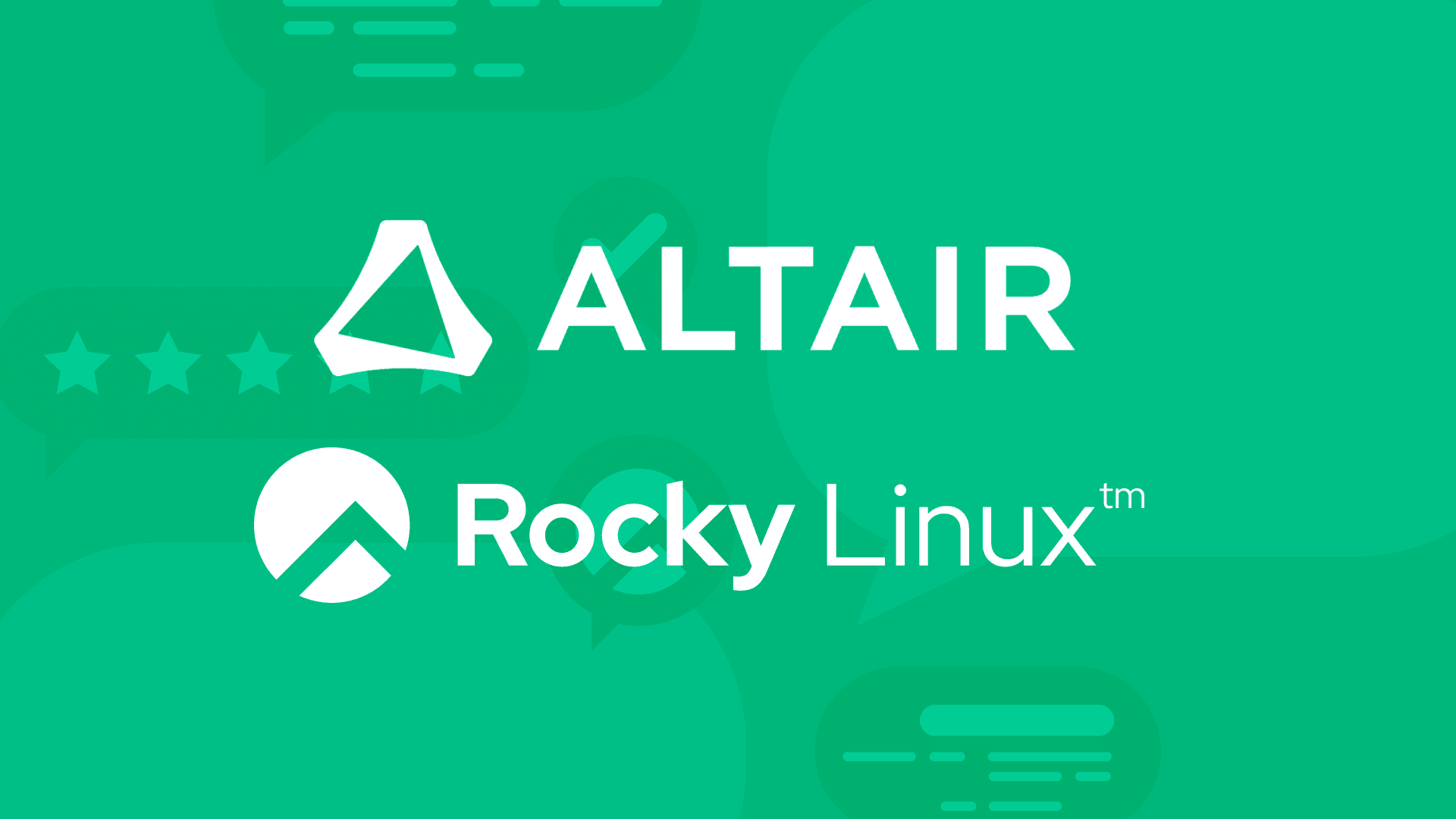6 min read
Top 5 Reasons to Switch to Rocky Linux

When it comes to choosing an operating system to run your enterprise, there can be dozens of reasons why you might (or might not) want to use something new. Right now, CentOS 7’s end of life on June 30 is one of the biggest reasons companies are looking for something new. The EOL is putting overwhelming pressure on companies around the world to find a new, modern successor to CentOS.
We believe Rocky Linux is that successor -- and it's not just because our CEO and founder, Gregory Kurtzer, created both OSes. There's been a ton of movement towards Rocky across several industries and companies of all sizes for many reasons.

Enterprise Linux 8 and 9 instances from Brian Clemens
Moving to a relatively new OS like Rocky isn't something to take lightly, so we asked Arthur Tyde, an entrepreneur and open source software advocate at CIQ, why he thinks people should switch. He's had his ear close to the ground for decades and has 5 compelling considerations enterprises should be thinking about. Most of this article contains his direct words transcribed from a video on the topic, with some additional resources or edits for clarity from the CIQ team.
Cost efficiency: You don't have to track or pay for Rocky licensing
One of the biggest reasons CentOS was so popular was its affordability. It offered fully-capable enterprise Linux at zero cost and complete compatibility with RHEL. (This is exactly what Rocky Linux is offering 10 years later.) There weren't any onerous or punitive licensing fees. If I was running a large compute cluster in a scenario where I needed a lot of nodes -- or even in scenarios where I started small and needed my infrastructure to vary -- I didn't have to worry about tracking licenses.
Sometimes the licensing fees were high, so when you're looking at something that's seen as "a proprietary solution" coming out of Red Hat, that can be very expensive. Many people we see moving to Rocky from CentOS are doing it because of cost. They wound up on CentOS for that reason, so it makes sense why that would remain a top consideration from an enterprise perspective.
Learn why Rocky Linux has a lower total cost of ownership (TCO).
Watch Arthur's video on cost-efficiency here.
Flexibility and customization: Options for every level of interest
Rocky Linux provides users with several flexible customization options, empowering them to tailor the operating system to their specific needs. Here's what you should know:
- It's completely open source: Unlike other enterprise Linux distributions where updates are squashed and source code isn't always completely open, Rocky Linux is completely free and open to everyone. Change whatever you need and make it completely yours.
- Variety of releases and capabilities: You can install several different versions of Rocky, from minimal to quick boot to images optimized for specific cloud providers. Deploy whatever you need as much and as often as you need.
- Enterprise compatibility: Whether you're an SMB or a global enterprise, you'll find a ton of value in Rocky's 100% bug-for-bug compatibility with RHEL. It's stable, secure, and performant.
- Support for multiple architectures: Rocky runs on AMD/Intel X86 64-bit (X86_64), ARM (aarch64), IBM Z (S390X), and even PowerPC (PPC64LE). (See for yourself.)
- Tons of desktop environments: Depending on your use case, you can choose from GNOME, KDE Plasma, XFCE, and several others. Each environment offers different features and customization options to suit personal preferences or specific enterprise requirements.
Rocky Linux's flexibility and customization capabilities are backed by a vibrant and diverse community. This community is instrumental in driving innovation and support for the operating system across various projects and initiatives.
- Community-driven innovation: The Rocky Linux community is robust and inclusive, comprised of contributors from diverse backgrounds and industries. This diversity fosters a wealth of ideas and solutions that cater to a wide range of enterprise needs.
- Projects and initiatives: Engage with the Rocky Enterprise Software Foundation (RESF) and explore its numerous projects Rocky Enterprise Software Foundation.
- Support and collaboration: Joining the Rocky Linux community means gaining access to a supportive network of users, developers, and enthusiasts who actively contribute to its evolution and adoption.
It's really easy to get involved. There's tons you can do in the Rocky world:
- Join the Rocky Enterprise Software Foundation (RESF).
- You can work with CIQ on open source projects, like Ascender. Ascender provides a web-based user interface, REST API, and task engine built on top of Ansible. It is based off the upstream project of AWX.
- Help with a Rocky Special Interest Group (SIG), like high performance computing.
- Join the OpenELA, a trade association of open source Enterprise Linux distribution developers.
Rocky Linux has no restrictions on usage, so you can customize it to your heart's content.
Watch Arthur's video on flexibility and customization here.
Transparency: Embrace clarity and community-driven innovation
When you're using a more closed or proprietary distribution, like RHEL, you don't really know what IBM or Red Hat's agenda is. The Rocky Enterprise Software Foundation is very transparent.
Rocky Linux's agenda is to be the most performant and stable enterprise Linux operating system out there. And because they're aligned with other sort of OpenELA based distros, that's a powerful thing.
Most CentOS users see moving to Rocky as kind of the natural progression. That's where it makes the most sense to go, but they could also go to SUSE Liberty. They could also go to Oracle Linux.
SUSE, Oracle, and Rocky participate in the OpenELA foundation. The goal of that is to essentially provide an open community-driven standard based on RHEL because we very much feel that it's in the community's interest to say what that is.
I think Red Hat did a lot of great work in establishing RHEL as a good default standard, but closing it up is a bad idea. OpenELA aims to keep the code open.
Watch Arthur's video on transparency here.
Compatibility and security: Seamless integration for enterprise continuity
Another reason to consider using Rocky is its compatibility with RHEL. A lot of people say "bit-for-bit" or "bug-for-bug" compatible. I don't actually like that comparison personally. I think what we're looking at is a default standard for what an enterprise Linux is with a focus on compatibility, performance, and stability.
Rocky Linux stands out with its seamless compatibility with RHEL, offering enterprise users a stable transition path without the pitfalls of proprietary lock-ins. You'll get continuity in operations while maintaining a high standard of performance and reliability crucial for mission-critical environments.
Watch Arthur's video on compatibility with RHEL here.
Not only does Rocky Linux offer seamless integration for enterprise continuity, it also safeguards your business continuity. Red Hat's CentOS EOL caught a lot of people by surprise. There are many companies that use CentOS in large compute clusters where intellectual property is created. I'm also thinking of the major manufacturers, electronics companies --- anybody who runs CentOS in a clustered compute environment doing simulations, designing electronics --- the list goes on and on.
The net of it is that they have a fiduciary responsibility to protect their intellectual property and when CentOS was EOL'd, people didn't expect it. All of a sudden, in one day at organizations where the protection of IP is really critical, they wake up and they're running an unsupported operating system.
Because of the way the Rocky ecosystem is designed, nobody can ever pull the rug out from you, which means you will always be running a supported operating system. You will also always know what the future looks like years down the road with no surprises.
That makes it easier for you to do your duty when it comes to regulatory compliance and so on. I think this is a great reason to switch to Rocky.
Watch Arthur's video on security here.
Vendor independence: Empowering ISVs and enterprise software
Independent software vendors (ISVs) are embracing Rocky like we've never seen before. Some of it is a reaction to feeling like they don't have any say in the direction of RHEL. So they see Rocky as an independent, community-driven distribution that they can work with. There's no questioning what the agenda is because it's open to the world.
We're seeing software ICs -- people who do supply chain software design and simulation, HPC -- many of the software vendors are saying, "You know what? We'd like more of a say in the direction of where enterprise Linux goes and we think we get that by embracing Rocky."
In that vein, we've seen just a huge uptick in the number of ISVs who are encouraging their users, telling them, "If you're going to switch to anything, you've got some choices out there. Make Rocky your first choice."
Many of them also do all of their internal software development on Rocky. If you're in the design simulation market and the simulation software was developed on Rocky, you might as well run Rocky. It doesn't cost anything and you'll get the best performance and stability. If you need to report a problem, you'll probably get much faster resolution to issues.
ISVs, in my estimation, are probably the most powerful reason for a company to consider switching to Rocky.
Watch Arthur's video on vendor independence here.
Ready to make the switch? Try Rocky Linux today!
Make the move to Rocky Linux and experience these benefits firsthand. Whether you're driven by cost efficiency, flexibility, transparency, compatibility, or vendor independence, Rocky Linux offers a compelling solution for your enterprise needs. Join countless organizations already benefiting from this robust, community-driven operating system. It's the fastest-growing enterprise Linux distro out there for a reason.
For more information or assistance with your transition, reach out to us at info@ciq.com. Our team is here to answer any questions and guide you through the process of adopting Rocky Linux seamlessly into your infrastructure.
Take control of your infrastructure's future with Rocky Linux. Try it today and discover why it's the smart choice for modern enterprises.
Built for Scale. Chosen by the World’s Best.
1.4M+
Rocky Linux instances
Being used world wide
90%
Of fortune 100 companies
Use CIQ supported technologies
250k
Avg. monthly downloads
Rocky Linux



